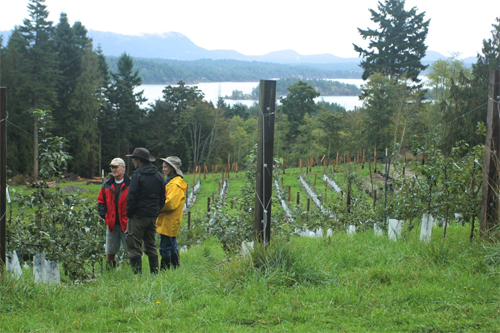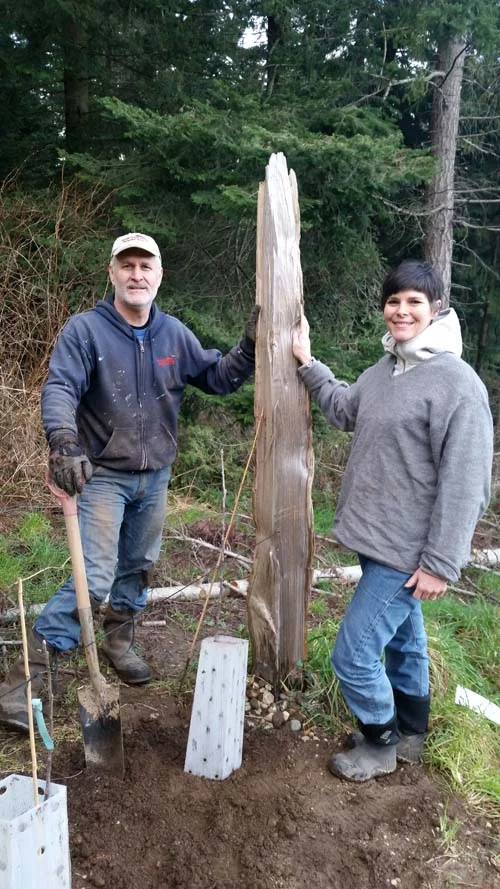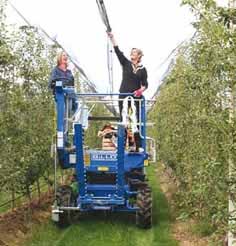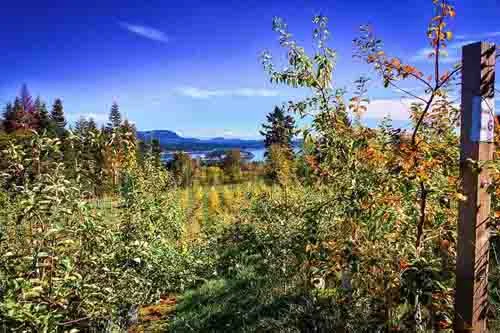Who We Are
Salt Spring Apple Company is a partnership between Peri Lavender and Brian Webster, with significant contributions from our orchard manager, family members, part-time workers, numerous volunteer WWOOFers and, of course, Jester the dog, our self-appointed (and semi-effective) wildlife control officer.
Why We're Doing This
Some folks will always buy the cheapest mass-produced food and beverages they can find, grown who-knows-where using questionable farming practices and shipped across the world. Salt Spring Apple Company does not target those folks.
Others – more and more all the time – are looking to reconnect their food choices with where they live and its history, eat and drink locally grown and made foods and connect with the farmers who grow it. We grow organic apples and use them to create quality food and beverage products for these other folks.
Some History
A century ago and more, Salt Spring Island was British Columbia’s primary source of fresh apples. Salt Spring apples were grown, sold and consumed in quantity on the Island and were shipped to the nearby cities of Victoria and Vancouver and across Western Canada.
In 1894, the B.C. Government reported that Salt Spring Islanders had planted some 13,739 apple trees. These were huge, productive standard-sized trees, each capable of producing dozens of bushels of fruit each year. By early in the 20th century, an estimated 20,000 bushel boxes – 360,000 kilograms of apples – were shipped off the island annually.
Salt Spring was B.C.’s fruit basket because our mild climate, decent soils and accessibility to relatively large cities made it an ideal place to grow apples. But that was before industrial agriculture changed the nature of food production – and almost every Canadian community’s landscape – in a fundamental way.
This change took only a few decades to occur, but its implications have been lasting. Cheap fossil fuels – and the gas-guzzling technologies they fostered – made it possible. Fossil fuels were transformational, enabling:
- Huge mechanized farms, including orchards.
- Extensive use of chemicals – many of them derived from fossil fuels – to eliminate pests, unwelcome plants and disease and to induce increased production.
- Inexpensive long-distance trucking.
The 20th century emergence of a fossil-fuel-based economy led to the production of apples – and virtually everything else we consume – shifting from close-to-home to distant locales. Inexpensive mass-grown ‘conventionally-produced’ apples, mainly from the Okanagan Valley and Washington State eventually drove Salt Spring Island’s apples from the marketplace. Before the 1920s were done, Salt Spring apple growing had been reduced to novelty and nostalgia.
It’s not just Salt Spring’s apple exports that dried up; even production for local consumption declined. By the time we started planting our little orchard, the vast majority of apples consumed on the Island came from elsewhere. It’s almost as if the attributes that once made the Island an apple haven had never really existed.
Encouraging New Directions
Everything that made Salt Spring Island a great place to grow apples in the 19th century is still true today. Salt Spring’s climate is mild, its soil is fertile enough for apples to thrive and the nearby markets of Victoria and Vancouver need fresh produce more than ever. For these reasons and others, we believe a renaissance for Salt Spring Island apple growing is at hand.
Today, there is renewed and increasing interest in wholesome, organic foods grown nearby. Salt Spring Island has developed strong regional (and even national) name recognition as a source for quirky, unique, high-quality products, whether artwork, cheese, wine or – yes – organic apples. And over the past decade, Salt Spring’s agricultural community has begun working together with purpose, dedicated to restoring the Island’s agricultural prominence.
While Okanagan and Similkameen Valley growers - not to mention the vast orchards of foreign lands - have climatic and economic advantages in mass-producing apples, smart Salt Spring growers are taking a different path, eschewing large-scale production of 'generic' varieties in favour of distinctive, high-quality, organic apple-growing that serves a niche market of connoisseurs and supporters of local and regional food production.
This is the direction we are going. It's why we established Salt Spring Apple Company. Through this business, we hope we're building on the inroads a handful of Salt Spring apple growers such as Harry Burton were already making when we started, while taking advantage of modern knowledge and techniques.
We're growing in harmony with the land and in our own small way, helping renew and reinvigorate Salt Spring’s position as British Columbia’s historic apple source.




